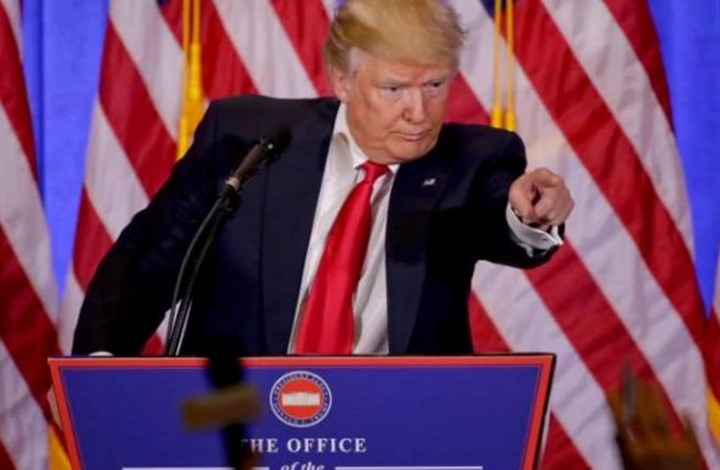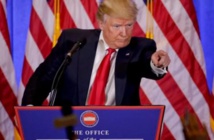In his first visit to US Central Command -- responsible for an area that includes the Middle East and Central Asia -- Trump also did not say whether he would scrap parts of the anti-IS mission in Iraq and Syria undertaken by his predecessor Barack Obama.
"Today, we deliver a message in one very unified voice to these forces of death and destruction -- America and its allies will defeat you. We will defeat them," he told about 300 military personnel at MacDill Air Force Base in Tampa, Florida.
"We will defeat radical Islamic terrorism. And we will not allow to it take root in our country," Trump added. "Freedom, security and justice will prevail."
He accused Islamic State fighters of leading a "campaign of genocide, committing atrocities across the world," and promised an unspecified "historic financial investment" in the US military.
"Radical Islamic terrorists are determined to strike our homeland as they did on 9/11, as they did from Boston to Orlando to San Bernardino, and all across Europe," added the president.
He claimed that the "very, very dishonest press doesn't want to report" on certain attacks, without offering any corroborating evidence to back up his allegation.
"They have their reasons," he said, without explaining further.
Trump made fighting "radical Islamic terrorism" a central plank of his election campaign, and the issue is emerging as the organizing principle of his foreign and domestic policies.
Centcom plays a key role in Operation Inherent Resolve -- the US-led mission to "degrade and defeat" IS. A total of 17,861 strikes have been launched across northern Syria and Iraq since August 2016 under the mission.
In late January, the president ordered generals to begin a 30-day review of the US strategy to defeat IS.
Trump visited Centcom as he made his way back to Washington following a three-day break at his Mar-a-Lago estate in southern Florida.
Apart from seizing territory and declaring a caliphate, IS has claimed responsibility for attacks in Africa, Europe, the United States, Southeast Asia and across the Middle East.
It's seen as having influenced attackers in San Bernardino, California who killed 14 people in December 2015, and the attacker of an Orlando nightclub who left 49 dead in June last year.
Trump used potential cooperation in the fight against the fighters as a reason to embrace Russia and has tried to implement an order banning refugees and nationals of seven Muslim-majority countries from entering the United States.
The ban has spurred an unprecedented battle with the courts. On Sunday, Trump tried to pin the blame for future attacks on the federal judge who has temporarily blocked his executive order.
"Just cannot believe a judge would put our country in such peril. If something happens blame him and court system. People pouring in. Bad!" Trump said.
He did not offer evidence for the suggestion that would-be terrorists are flocking to the country.
Most experts express more concern about Americans becoming radicalized and carrying out IS-inspired attacks, rather than the group dispatching clandestine agents around the world.
The contours of Trump's policy to fight the Islamic State group abroad are still coming into focus, after less than three weeks on the job.
His call for a review of the anti-IS campaign included any "recommended changes to any United States rules of engagement."
That could foreshadow a tougher approach, but it is one that some experts warn could fuel radicalization.
During Trump's first days in office, US special forces carried out a raid against Al-Qaeda in Yemen that resulted in the death of one US soldier, 14 jihadists and as many as 16 civilians.
Trump also called for the "identification of new coalition partners" -- a likely nod toward Russia.
Moscow has deployed aircraft, naval assets and troops to Syria, but has so far trained its fire on rebels with the aim of propping up Bashar al-Assad's regime.
After substantial territorial gains, IS is now on the back foot, struggling to hold onto the Iraqi city of Mosul and with its "capital" in Raqa under threat.
But the battle is approaching a fork in the road.
Trump has reportedly shelved Obama's plans for taking Raqa with the help of Kurdish forces and must soon decide how to proceed.
"Today, we deliver a message in one very unified voice to these forces of death and destruction -- America and its allies will defeat you. We will defeat them," he told about 300 military personnel at MacDill Air Force Base in Tampa, Florida.
"We will defeat radical Islamic terrorism. And we will not allow to it take root in our country," Trump added. "Freedom, security and justice will prevail."
He accused Islamic State fighters of leading a "campaign of genocide, committing atrocities across the world," and promised an unspecified "historic financial investment" in the US military.
"Radical Islamic terrorists are determined to strike our homeland as they did on 9/11, as they did from Boston to Orlando to San Bernardino, and all across Europe," added the president.
He claimed that the "very, very dishonest press doesn't want to report" on certain attacks, without offering any corroborating evidence to back up his allegation.
"They have their reasons," he said, without explaining further.
- 30-day review -
Trump made fighting "radical Islamic terrorism" a central plank of his election campaign, and the issue is emerging as the organizing principle of his foreign and domestic policies.
Centcom plays a key role in Operation Inherent Resolve -- the US-led mission to "degrade and defeat" IS. A total of 17,861 strikes have been launched across northern Syria and Iraq since August 2016 under the mission.
In late January, the president ordered generals to begin a 30-day review of the US strategy to defeat IS.
Trump visited Centcom as he made his way back to Washington following a three-day break at his Mar-a-Lago estate in southern Florida.
Apart from seizing territory and declaring a caliphate, IS has claimed responsibility for attacks in Africa, Europe, the United States, Southeast Asia and across the Middle East.
It's seen as having influenced attackers in San Bernardino, California who killed 14 people in December 2015, and the attacker of an Orlando nightclub who left 49 dead in June last year.
- Work with Russia? -
Trump used potential cooperation in the fight against the fighters as a reason to embrace Russia and has tried to implement an order banning refugees and nationals of seven Muslim-majority countries from entering the United States.
The ban has spurred an unprecedented battle with the courts. On Sunday, Trump tried to pin the blame for future attacks on the federal judge who has temporarily blocked his executive order.
"Just cannot believe a judge would put our country in such peril. If something happens blame him and court system. People pouring in. Bad!" Trump said.
He did not offer evidence for the suggestion that would-be terrorists are flocking to the country.
Most experts express more concern about Americans becoming radicalized and carrying out IS-inspired attacks, rather than the group dispatching clandestine agents around the world.
- Taking the fight to IS -
The contours of Trump's policy to fight the Islamic State group abroad are still coming into focus, after less than three weeks on the job.
His call for a review of the anti-IS campaign included any "recommended changes to any United States rules of engagement."
That could foreshadow a tougher approach, but it is one that some experts warn could fuel radicalization.
During Trump's first days in office, US special forces carried out a raid against Al-Qaeda in Yemen that resulted in the death of one US soldier, 14 jihadists and as many as 16 civilians.
Trump also called for the "identification of new coalition partners" -- a likely nod toward Russia.
Moscow has deployed aircraft, naval assets and troops to Syria, but has so far trained its fire on rebels with the aim of propping up Bashar al-Assad's regime.
After substantial territorial gains, IS is now on the back foot, struggling to hold onto the Iraqi city of Mosul and with its "capital" in Raqa under threat.
But the battle is approaching a fork in the road.
Trump has reportedly shelved Obama's plans for taking Raqa with the help of Kurdish forces and must soon decide how to proceed.









 Home
Home Politics
Politics











